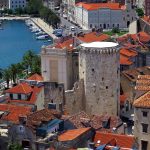The latest on the migrant crisis in Croatia.
In the temporary reception centre in Opatovac there are no longer any refugees, Jelena Bikić, a spokeswoman for the Ministry of Interior, said and pointed out that the transport of refugees from the new winter transit centre in Slavonski Brod to the border with Slovenia is going on in coordination with the Slovenian government, reports Vecernji List on November 5, 2015. In the last 24 hours, Croatia has sent to Slovenia some 5,000 refugees and migrants. Registration process of refugees in the new winter camp is flowing smoothly. “As of 9 am this morning, there are no more refugees in Opatovac”, Bikić said.
Head of the crisis centre of the Ministry of Health Maja Grbat Bujević reported that in the last 24 hours 149 people and 30 children have received medical assistance. Cold and fever are the main health problems that doctors treat at the centre in Slavonski Brod, where there are three medical teams made up of doctors and nurses, as well as a team of emergency medical services personnel.
After the Croatian government last Thursday approved the payment of 27.7 million kuna from budgetary reserve to cover the expenses incurred during the process of receiving and transporting refugees and migrants (registration, accommodation, food, drink, medical care), the government will today approve additional 10,784,000 kuna. From the budgetary reserve, the Ministry of Interior will receive 5,995,000 kuna, the Directorate for Commodity Reserves 438,500 kuna, the State Administration for Protection and Rescue 1.358 million kuna, and the Croatian Employment Service – for public works in support of migrants – 2.993 million kuna. Interior minister Ranko Ostojić said that Croatia on average spends about two million kuna a day on the refugee crisis.
From midnight to 9 pm on Wednesday, 7,792 migrants entered Croatia. Currently, there are 3,304 migrants at the winter transit centre in Slavonski Brod. Since the beginning of the migration crisis, 325,782 migrants and refugees have entered Croatia.
Slovenian government is preparing a number of measures in case of worsening of the migrant crisis, and does not exclude the possibility of withdrawing Slovenian soldiers from international missions and activation of reserve forces, said defence minister Andreja Katić.
“The army is ready to assist the police if necessary”, Katić said to reporters about possible additional Slovenian measures if Austria and Germany were to restrict the reception of migrants and the influx from Croatia continues. “We have to be prepared for anything” Katić said, refusing to confirm or deny that the government has already ordered a chain-link fence to defend the southern border with Croatia. Several members of the Slovenian parliament confirmed that they have been informed that the government has “bought the fence”, but they consider it as a normal preventive measure. However, technical obstacles will not be sufficient to stop the uncontrolled migrant wave because behind the fence there must be a “living wall” who will protect it.
The Hungarian parliament passed a resolution accusing the European Commission that it had no legal basis to force member states to implement the mechanism for relocation of refugees on a quota system, while Czech president Milos Zeman said the flow of refugees and migrants to the EU represented an organized “invasion” of Europe and that it would “come a time when the Czech army will have to intervene in defence of the Czech borders”.
While Hungary, Czech Republic and Slovakia continue to oppose the idea of relocation of refugees throughout the EU as a way of stopping the uncontrolled influx, Greece yesterday relocated first 30 asylum seekers from Iraq and Syria to Luxembourg, bringing the total of relocated refugees from Italy and Greece to only 116 people. The plan is that in the two years 160,000 refugees should be relocated, but at this rate it looks impossible. European Council president Donald Tusk has therefore decided to convene another extraordinary EU summit, the fifth such summit dedicated to the refugee crisis in the last six months.
“The situation remains very serious. In October, we had a record of 218,000 refugees and migrants who crossed the Mediterranean Sea”, Tusk said in a letter send to prime ministers and presidents of 28 countries in which he invited them to an informal EU summit on Malta on 12 November. In the letter, Tusk says that “we should do everything we can” to prevent the break-up of the Schengen Zone.
Sources in the Croatian government say that prime minister Zoran Milanović will participate in the informal summit. Croatian President Kolinda Grabar-Kitarović’s office also believes that it is up to government to participate in the summit, even though it is currently in “caretaker status”.







